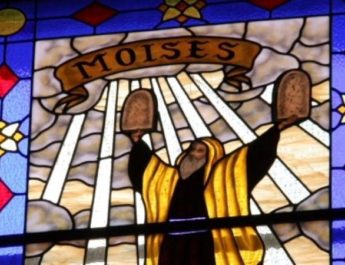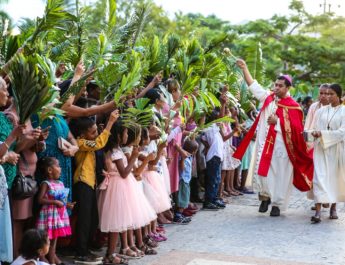Psalm 34:1-10
Narrative Lectionary 426
Of David,A when he feignedB madnessC beforeD Abimelech,E so that he drove him out,F and he went away.G
A “David” = david. From the same as dod (beloved, love, uncle); the root may mean to boil, which is used figuratively to describe love. So, this implies someone you love such as a friend, a lover, or a close family member like an uncle. David’s name likely means something like “beloved one.”
B “feigned” = shanah. This is to fold, repeat, double, alter, or disguise.
C “madness” = taam. 13x in OT. From taam (to taste, perceive). This is taste, perception, discernment, decree, understanding, sanity.
D “before” = paneh. From panah (to turn, face, appear). This is face in a literal or figurative sense. It could be face, presence, anger, respect. It can also be used of God to indicate divine favor or presence.
E “Abimelech” = abimelek. From ab (father literal or figurative) + melek (king, royal). This is Abimelech, meaning “father is king.”
F “drove…out” = garash. This is to cast out or expel. It can be to exile someone or to divorce them.
G “went away” = halak. This is go, come, walk. It is walk literally and figuratively and includes people and animals. It can be used figuratively for one’s moral life – how we walk according to God’s way or against it. It can also refer to the walk of life as in the course one’s life takes, the choices we make, etc.
1 I will blessH the LordI at all times;J
his praiseK shall continually be in my mouth.
H “bless” = barak. This is to kneel, to bless. It is blessing God as part of worship and adoration or blessing humans to help them. It can be used as a euphemism to say curse God.
I “Lord” = YHVH. From havah (to be, become) or hayah (to come to pass, become, be). This is the name of the God of Israel, the self-existent and eternal one, the tetragrammaton. This pronunciation has been lost to time so “Lord” is generally used in its place.
J “times” = et. Probably from anah (to answer, sing, announce); from ad (forever, all, old); from adah (to pass on, advance, decorate oneself). This is a period or season. It can also mean whenever or continually.
K “praise” = tehillah. From halal (to praise, be boastful). This is praise or a song of praise. It is to offer God a hymn, to boast in God. This shares a root with “hallelujah.”
2 My soulL makes its boastM in the Lord;
let the humbleN hearO and be glad.P
L “soul” = nephesh. Related to naphash (to refresh or be refreshed). This is soul, self, person, emotion. It is a breathing creature. Can also refer to appetites and desires.
M “makes its boast” = halal. Related to “praise” in v1. See note K above. This is to be clear – it originally referred to a sound, then a color. It was to shine and then make a show or boast then to rave. In a causative sense it came to mean celebrate, give glory, sing praise, or be worth of praise. Because of the celebratory nature of the word, it could also mean to give in marriage. This is where “Hallelujah” comes from.
N “humble” = anav. From anah (to be bowed down; can refer to a sense of humility or to a sense of being browbeaten, oppressed, afflicted, or depressed; literal or figurative – depressed in mood or circumstance). This is poor, needy, afflicted as well as humble or meek.
O “hear” = shama. This is to hear, call, consent, or consider. It implies listening intelligently, giving attention, and, because of these two factors, obedience and action are often implied.
P “be glad” = samach. This is to rejoice or be glad. Properly, it is to brighten up in a literal or figurative sense.
3 O magnifyQ the Lord with me,
and let us exaltR his nameS together.T
Q “magnify” = gadal. This is to grow up, become great, become wealthy – to advance. The root meaning may be to twist in the sense of the process of growing.
R “exalt” = rum. This is to rise or raise, to be high literally or figuratively. So it can also mean to exalt or extol.
S “name” = shem. May be from sum (to put, place, set). This is name, fame, renown. A name was thought to indicate something essential about a person – something about their individuality. So, this word can also mean honor, authority, or character.
T “together” = yachad. From yachad (to join, be united). This is a unit, both, altogether, unitedness, alike.
4 I soughtU the Lord, and he answeredV me,
and deliveredW me from all my fears.X
U “sought” = darash. This is seek, ask, inquire, care for. Generally it means following in pursuit or following as part of a search, which implies seeking or asking. Also used specially to mean worship.
V “answered” = anah. Perhaps related to “times” in v1. See note J above.
W “delivered” = natsal. This is to snatch someone or something away in a good sense – as rescue, defend, or deliver – or in a bad sense – as strip or plunder.
X “fears” = megurah. 3x in OT. From gur (properly, the act of turning off the road for any reason; sojourning, becoming a guest; can mean being fearful since one is outside of home territory; also dwelling, living, or inhabiting if one has turned off the root to encamp for a longer duration) OR from magor (fear, panic, terror); {from gur (to quarrel, stir, attack) or from gur (see above) or magur sojourning, dwelling place, permanent place of residence)}. This is storehouse, barn, fear.
5 LookY to him, and be radiant;Z
so your faces shall never be ashamed.AA
Y “look” = nabat. This is to behold, look at intently, consider, or scan. It can mean to have respect or regard someone favorably.
Z “be radiant” = nahar. 6x in OT. This is to flow, sparkle, be cheerful, assemble.
AA “be ashamed” = chapher. 17x in OT. Perhaps from the same as chaphar (properly to pry into; to dig search for, sink, or explore). This is to be ashamed, disgraced, embarrassed, confounded – to blush.
6 This poorBB soul cried,CC and was heard by the Lord,
and was savedDD from every trouble.EE
BB “poor” = ani. Related to “humble” in v2. From anah (see note N above). This is humble, lowly, poor, or afflicted.
CC “cried” = qara. This is to call or call out – to call someone by name. Also used more broadly for calling forth.
DD “saved” = yasha. To deliver, defend, help, preserve, rescue, be safe. Properly, to be open, wide or free, which implies being safe. Used causatively, it means to free.
EE “trouble” = tsarah. From tsar (properly, a narrow or constricted place; figuratively, trouble, a pebble, an enemy, anguish, or distress); from tsarar (to bind, restrict, narrow, be cramped, an adversary). This is tightness, distress, affliction, trouble, or adversary.
7 The angelFF of the Lord encampsGG
aroundHH those who fearII him, and deliversJJ them.
FF “angel” = malak. This is a messenger, an angel, or a deputy of some kind. Can be used for human messengers literally or for prophets, priests, or teachers as messengers of God. Also used for supernatural messengers i.e. angels.
GG “encamps” = chanah. This is decline, bending down, or living in tents. It can be camping to create a home or camping as a part of battle.
HH “around” = sabib. From sabab (turning around, going around; to surround, cast, walk, fetch; to revolve or border in a literal or figurative sense). This is a circuit or a circle. It could refer to an environment, one’s neighbors, or a circular path round about.
II “fear” = yare. From the same as yare (to fear, be afraid, dreadful; also fearful reverence – to fear in a moral sense is to say to revere, respect). This is fearful or morally reverent.
JJ “delivers” = chalats. This is to turn back or away in a literal or figurative sense. So, it could be return, break, build, retreat. It doesn’t necessarily imply going back to the place you started.
8 O tasteKK and see that the Lord is good;LL
happyMM are thoseNN who take refugeOO in him.
KK “taste” = taam. 11x in OT. This is to taste, sense, or figuratively to perceive.
LL “good” = tob. From tob (to be pleasing, to be good). This is good, beautiful, pleasant, agreeable, bountiful, at ease. This word is used for goodness as a concept, a good thing, a good person. This can refer to prosperity and welfare as well as joy, kindness, sweetness, and graciousness. So, this is ethically good, but also enjoyably good.
MM “happy” = esher. From ashar (to go straight, lead, guide; to be level and so to be right, blessed, honest, happy). This is happy or blessedness.
NN “those” = geber. From gabar (to be strong or mighty; to prevail or to be insolent) This is man, warrior, a person generally, or a valiant person.
OO “take refuge” = chasah. This is to take refuge or flee for protection. Figuratively, it means to hope or trust in someone or something.
9 O fearPP the Lord, you his holy ones,QQ
for those who fear him have no want.RR
PP “fear” = yare. Related to “fear” in v7. See note II above. This is to fear, be afraid, dreadful. It can also refer to fearful reverence – to fear in a moral sense is to say to revere, respect.
QQ “holy ones” = qadosh. From qodesh (set apart and so sacred; God is different from us and so God is holy/set apart; things we dedicate to God’s service are set apart for God and so they, too, are holy); related to qadash (set apart, consecrated, hallowed, sanctified; something or someone set apart for a holy purpose or use – ceremonially or morally clean). This is sacred or holy in a ritual or moral sense. As a noun, it refers to a holy one (like a saint or angel), a holy place (the sanctuary), or God (the Holy One).
RR “want” = machsor. 13x in OT. From chaser (to lack, need, become empty, to fail). Related to “I shall not want” from Psalm 23:1. This is something needed so it could be lack, poverty, or deficiency.
10 The young lionsSS suffer wantTT and hunger,UU
but those who seek the Lord lackVV no good thing.
SS “young lions” = kephir. Perhaps from kaphar (to appease, cover, pacify, cancel). This is a young lion – maybe in the sense that it has a mane covering.
TT “suffer want” = rush. This is in want, lack, poor, needy.
UU “hunger” = raeb. 17x in OT. This is to be hungry or famished.
VV “lack” = chaser. Related to “want” in v9. See note RR above.
Image credit: “View of Oyster Bay” by Louis Comfort Tiffany, approximately 1908.




